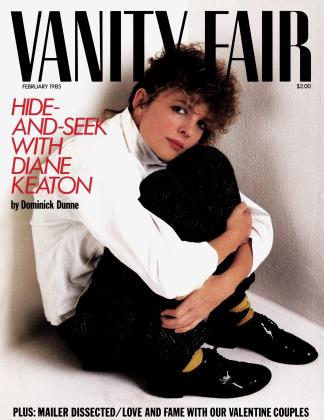Sign In to Your Account
Subscribers have complete access to the archive.
Sign In Not a Subscriber?Join NowNow, This Is Rich
Judith Green
My only previous greening (and that's pure-envy greening) with self-help books had been watching them devour more and more of the New York Times best-seller list. Believe me, it's not that I haven't craved a bella-fonda figura, sought a ladylike way to give a guy a karate chop, or considered the possibility of having a nice person like myself for my best friend. I want them all, but what I have always wanted most was to discover just how to achieve the wealth and celebrity of a best-selling author. Clearly, there's a great living to be made in the cottage industry of selfhelp books.
Therefore, when 1 received Dr. Tessa Albert Warschaw's daunting tome Rich Is Better: How Women Can Bridge the Gap Between Wanting and Having It All—Financially, Emotionally, Professionally (Doubleday) and read that reprint rights had been sold to no less than Glamour, Cosmopolitan, and New Woman, I couldn't wait to begin this latest Triptik to happiness. Before we can get to the scenic route, however, we must extricate ourselves, Dr. Warschaw explains, from our Poverty Mentality— an attitude that entails those unique feelings of "ambivalence," "undeservingness," "vacant hope," and "guilt." Throughout 312 pages of what seems like deja vu, our journey introduces us to many a lost traveler whose only hope is a pit stop at the knee of Dr. Warschaw.
Early on we meet Sarah, almost forty, a devoted wife of fifteen years. She has "masses of curly hair," "a warm serenity," a "jeans-and-espadrilles artiness," even "a certain insouciance." She reads "everyone from Steinbeck to Colette to Virginia Woolf." In fact, she herself writes brilliantly, though furtively. She dreams of being a dress designer.
Sarah's husband is "a controlling father figure." He makes all of Sarah's decisions, but he just can't seem to make a living, "often losing his shirt." He's more than a social drinker, and suffers from a terminally bruised ego. He dreams of being an entrepreneur.
Sarah is in "great pain"; afraid of losing her husband, of being on her own, she takes tranquilizers. She doesn't know what to do and so consults Dr. Warschaw, who counsels her on how to get rid of her Poverty Mentality. The doctor advises her to examine her marriage, her friends, her goals. She tells Sarah to live on her own, to float a loan from her family and pursue her writing. She warns Sarah about the need for discipline, and cautions her that only after her writing is finished should she allow herself the reward of "a run on the beach with her Sony Walkman."
When we see Sarah again, almost two years have gone by. Thanks to Dr. Warschaw, Sarah's divorce is final. She is living with a "charming, funny, talented fellow writer." Her novel is just about completed. Sarah's old roots are gone; she has been successfully rerouted by Dr. Warschaw.
Later in Dr. Warschaw's book we meet Nora and Todd. They are at first "a delightedly dissimilar married couple with lots of goodwill." In their late thirties, they have both been divorced, and are deeply in love. Nora is a levelheaded market researcher; Todd is a flamboyant, creative chef. But their marriage is almost a game: she hides what she's saved, he hides what he's spent. Nora comes to resent being led into financial panic, while Todd resents her not letting him have fun. Their fears and guilt are breaking them apart. They don't know what to do, so they consult Dr. Warschaw, who counsels them on how to get rid of their joint Poverty Mentality. She advises them to be honest with each other, suggesting that each keep a "diary of expenditures." She tells them to look at their incomes not as "mine" and "yours," but as "ours." She also suggests that "all purchases over seventy-five dollars be run past the other first."
When we last see Nora and Todd, it is six months later. Thanks to Dr. Warschaw, they know where their money is going. Their discontent has been replaced by the new riches they have discovered in each other. Dr. Warschaw reroutes again.
All of Dr. Warschaw's "clients"— and they are numerous—are similarly successful, and thinking about their success led me to a very curious awakening. Recently, I was at the beauty parlor, which for me always works better than self-help books. My old friend Suzanne was there, too, but I hardly recognized her. She looked so young, so beautiful. She told me she was remarrying, "very, very rich." She thanked me for counseling her to have Joseph cut her hair. As I squinted at the dazzling lack of Poverty Mentality on her finger, I suddenly thought of Dr. Warschaw and her book and how with seeming simplicity she had left not one pitiful pearl unstrung. "You're welcome," I said slowly as 1 rushed to call my publisher. Who knows what how-to beauty book lurks in the likes of me?
 View Full Issue
View Full Issue












Subscribers have complete access to the archive.
Sign In Not a Subscriber?Join Now